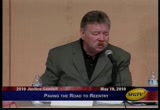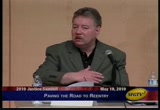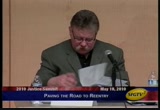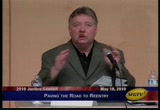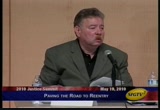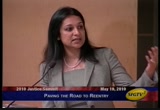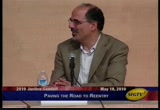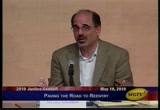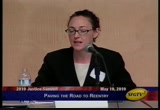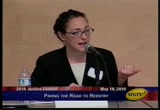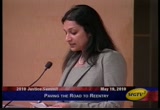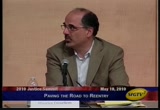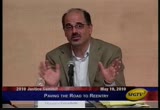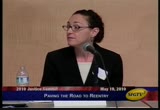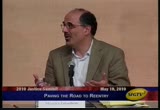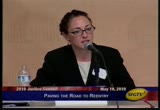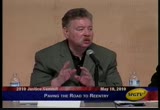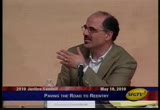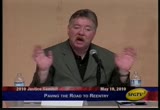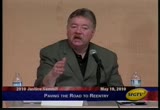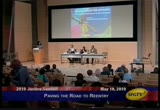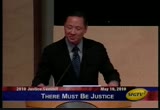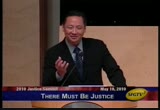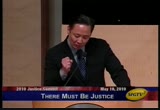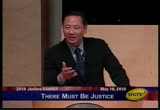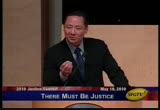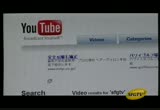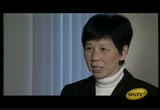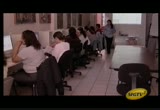tv [untitled] September 19, 2010 2:30am-3:00am PST
3:30 am
and people's aberrations with it or problems with it or confusions should send them to present for life sentences. in wisconsin, they have the same thing in iowa and illinois -- actually have built prisons just for sex offenders. can you imagine? the entire prison are sex offenders, mostly young men. that is what they are. young men who are confused about their sexuality. as my son was or your son was. i'm going to continue with this, just some of the suggestions we have had. get rid of the word "officer." you have police officers -- isn't that enough? we have, like, 2 million of them. it should be social workers, correctional workers. parole workers. get rid of parole officers and probation officers all together.
3:31 am
i call them resource centers so that when somebody comes out of jail or prison, that it would not matter if they came out of a mental hospital or and mentally retarded group home or they are getting out of jail or sleeping on the streets, when they get out, they go to something called a resourced center for health, and there, there would be social worker people that would help them. it does not really matter if they get out of jail or prison and a sleeping on the streets. i saw the same people in different pieces of their dreams. we provide visitors with a real release program, which means at least money to live for 90 days -- takes at least 90 days, right? to get a job, find a place to live. they are walking out of prison in many states with zero, no money. mercy releases for ill
3:32 am
prisoners. do you know what they do in federal prison? you have hepatitis c or aids or hiv, they lock you in solitary confinement until you die. that is what they do. that is what they do. i have seen marines out of the military prison -- i have seen them in leavenworth dying in solitary confinement. marines. because they got aids or hepatitis c. convert visn's into what i call residential treatment centers. -- convert prisons. knock down the gun towers. take down the razor wires. inspired the corrections officers, the people with badges that make $150,000 a year -- inspire their asses. [applause] i am all for the union. i do not like their union. what you do is you rehire people
3:33 am
back as correctional workers. what happens is in a state of california, where somebody needs help because they contradict or alcoholic or have a bad temper and they are going to be of their wife or sexually assault her stepdaughter -- whatever their problem is, let's do something about crime before they commit the crimes. they have this urge to do something illegal. they call the police and say, "i need help. i'm drug addicted. an alcoholic. please help me." right? they are directed to this treatment center where they can voluntary commit themselves for three to six months. they will do a workshop -- workup on their health. they need a health care assessment, and social work assessment, they have three to six months in which they work within 24/72 upgrade their
3:34 am
behavior is and abilities rather than wait for them to commit a crime and then send them to prison, right? we call these residential treatment centers. the place has 2000 beds. they can treat as many as 8000 people a year. in california, the reason they have so many heroin addicts on the street because you are a heroin addict, you cannot get drug treatment. the only of us who can get it are people with health insurance. anyone will tell you on the street we need residential drug treatment. take some of these dam presence, take down the gun towers, turned into a residential drug treatment centers -- some of these damned prisons.
3:35 am
>> what are your suggestions as to the reform? one area we have not really talked about much is the impact of technology. where is that going now, and how do we need to expend that? how do we deal with the information that is being disseminated, how do we slow that down? are there other areas that also are bleeding into employment and housing, and what is the solution, is my question? he>> there has been a real leadership on the country to come up with smarter ideas, and we have had a lot of good examples and policies, state and federal for the past 10 years or
3:36 am
so, so the reform agenda is not that big a secret. they have been a lot of reports that put it together in one place. i think the real challenge that has been touched on is really leadership, and a lot of it has to do with leadership and people really stepping up in leadership positions, and unfortunately, the politics of the equation are still really complicated. that is what a lot of people are saying. it is so easy to drop a bill and create havoc on thousands of workers, and that is what happens for political reasons. i honestly do not think that -- remember when a trucker -- when the truck below up on the other side of the bay bridge? there were and million accusations that that trucker had a criminal record and that is why, basically, the truck blew up and we had all these problems, so there were bills
3:37 am
dropped in statements made by leading politicians from boxer on down. it turned out his record was very minor and had nothing to do with the driver or anything else. the guy was fine, and he has been working hard to put his life back together. we want to reward that kind of thing. i think it takes a lot of real leadership and there are some great leaders out there and started to staff in addition to political figures. in a lot of credit to civil rights organizations that are starting to do a lot in this area. the naacp, the new director really has made this an important issue, and that is what is going to take. we could run down the list of all the great things there are to do, but we have to push back on this kind of hysteria on crime, and it takes leadership to do it -- it takes individuals, all of us, to do it as well, to put pressure on leaders, but it takes real
3:38 am
leadership to do that. that is how i would put it together all in one place. >> in the vein of what is hopeful, and there is a reentry coordinating council in san francisco and also one in alameda county. what has been helpful to me is i think that overwhelmingly, we have this being tough on crime problem as opposed to being smart on crime, but i think that even in places where you would not expect it, people are starting to make the connection. for example, a lieutenant from the sheriff's department in alameda county is one of the most consistent and supported participants in the coordinating council for reentry in alameda county. i would say it is an unlikely ally, and i'm sure that we are lucky in his leadership and support. but i do think it is because they are starting to see the connection between services and opportunities for people after incarceration. and the outcomes, which are
3:39 am
positive. in the same vein, my office, we have funding to provide legal services for people with criminal records. unfortunately, the san francisco public defender is unique in this state. there are a few other models, but it is unfortunately not in every county, but there is a clean slate project, and that is not a foregone conclusion. the other thing is i and my bad attitude, i probably lost over the good laws that do exist. one challenge where i hope we see a lot of movement is dismantling the structural barriers people have and space from accessing what laws do exist, so that would be another one. from the very least, providing these legal services around the state. also, just a simple "know your
3:40 am
rights" campaign. there are people who are lawyers who probably do not know the laws and what protections are a fortune in the realm of employment law but also what remedies are available in the realm of reentry/criminal law. >> thank you very much. we have a few questions from the audience. when people lose their jobs, they are tonight and of limit benefits. this is to meet stiff and denies a safety net for those re- entering. is this something that should be changed? >> years ago there were situations that you could benefit from unemployment benefits.
3:41 am
people need help and income to get by. that is not unprecedented and there are really good arguments for doing that. it is a big list if you are calling it unemployment benefit. i would call this income support and think along those lines. >> many people have criminal backgrounds which are dismissed. mr. anyway to see employers -- is anyway to determine dismissed employers? >> it is the state criminal
3:42 am
3:43 am
3:44 am
issues. this follows discrimination charges. if you would take an adverse action against you, you are supposed to have a copy with the record. get your hands on the thing. they're supposed to do this. i lost this job because of my record. we can work to try to figure this out. >> city departments and courts routinely calls up the names of those arrested on the internet. what can be done to protect people from this kind of dissemination?
3:45 am
>> i think that we are fortunate in this county where they put all court records on the internet. i has been in heated discussions. there are competing first amendment issues. i don't know what the solution is that i know that there are two competing concerns. >> how many of his people -- of the people in this room have ever check their own criminal
3:46 am
record? we have projections for your medical records why are people checking each other hoout? why is this even available. the next thing will be your medical records. they will put your grades out there. can you imagine? >> i think that this is a first amendment issue for the most part there are decisions out here to deal with this. this is public information.
3:47 am
when it goes from the courthouse, that is where it is out of control. we're supposed to have lost to deal with this. how you plug the hole is really tough. there is another side to it. >> let's look at this in a whole different way. let's provide for the fact that you don't have any privacy i deal with people coming out of prison who are e-mail in me and calling me almost every single day there are felons that cannot
3:48 am
give jobs. it is hard to get into a public university if they are a convicted felon. people coming out of prisons have been denied entry into universities. there is no place to hide anymore. if you get out of prison, you have to develop a way to talk about yourself and assume that they don't have your criminal record. people leaves their information on the counter and say walk
3:49 am
away. never let it out of your hand. if the manager is not there, sit-down until the manager comes back. when you do meet the manager, and then your application. now, maybe, you will get an interview. you never would have if you left the application. you have to make a personal, you have to make it one on one. they have to learn how to talk about themselves in order to get a job. >> that is a person by person case.
3:50 am
i hope that we are moving in the direction of whether or not people have their criminal record public. >> i want to thank all of the panelists for taking time out of their busy schedule. thank you very much. >> thank you very much. we hope that the summit raise issues that you normally don't see on your broadcast
3:51 am
television. i think that we sent out to accomplish three things. the first question as it is presented to and for trade both on the news as well as in hollywood movies. secondly, we should be honest about where the system is failing. at one time, our office was a public defender's office. we have made huge steps to make it just this mean for and create outcomes that are just.
3:52 am
3:53 am
we have seen that this falls on deaf ears. unless the people make their voices heard, we will not see change. we know this is a recipe for failure. going forward, we must become involved in the justice system. this is not someone else's problem. we will sit and wonder why the crime rates have gone up.
3:54 am
>> when you think about the cost to our society and every person that lives in our society. it becomes very clear that we have no option but to act and act now. i am hoping that you will be motivated to get involved in non ordinary justice. we have yet to live up to that promise. i look forward to working with all of you call ever to pla.
3:55 am
3:57 am
internet provides real access to real people and resources and that's what we're try to go accomplish. >> i was interested in technology like video production. it's interesting, you get to create your own work and it reflects what you feel about saying things so it gives perspective on issues. >> we work really hard to develop very in depth content, but if they don't have a venue, they do not have a way to show us, then this work is only staying here inside and nobody knows the brilliance and the amazing work that the students are doing. >> the term has changed over time from a very basic who has a computer and who doesn't have a computer to now who has access to the internet, especially high speed internet, as well as the skills and the knowledge to use those tools effectively. . >> the city is charged with coming up with digital inclusion. the department of
3:58 am
telecommunications put together a 15 member san francisco tech connect task force. we want the digital inclusion program to make sure we address the needs of underserved vulnerable communities, not communities that are already very tech savvy. we are here to provide a, b and c to the seniors. a stands for access. b stands for basic skills and c stands for content. and unless we have all three, the monolingual chinese seniors are never going to be able to use the computer or the internet. >> a lot of the barrier is knowledge. people don't know that these computers are available to them, plus they don't know what is useful. >> there are so many businesses in the bay area that are constantly retiring their computer equipment that's perfectly good for home use. computers and internet access are helping everybody in the community and people who don't have it can come to us to help with that.
3:59 am
one of the biggest problems we see isn't whether people can get computers through programs like ours, but whether they can understand why they need a computer. really the biggest issue we are facing today is helping people understand the value of having a computer. >> immediately they would say can i afford a computer? i don't speak any english. how do i use it. then they will start to learn how to do email or how to go back to chinese newspaper to read all the chinese newspaper. >> a lot of the barrier still is around lack of knowledge or confusion or intimidation and not having people in their peer network who use computers in their lives. >> the important thing i learned from caminos was to improve myself personally. when i first came to caminos, i didn't know anything about computers. the second thing is i have become -- i have made some great achievements as an individual in my family and
53 Views
IN COLLECTIONS
SFGTV2: San Francisco Government Television Television Archive
Television Archive  Television Archive News Search Service
Television Archive News Search Service 
Uploaded by TV Archive on

 Live Music Archive
Live Music Archive Librivox Free Audio
Librivox Free Audio Metropolitan Museum
Metropolitan Museum Cleveland Museum of Art
Cleveland Museum of Art Internet Arcade
Internet Arcade Console Living Room
Console Living Room Books to Borrow
Books to Borrow Open Library
Open Library TV News
TV News Understanding 9/11
Understanding 9/11